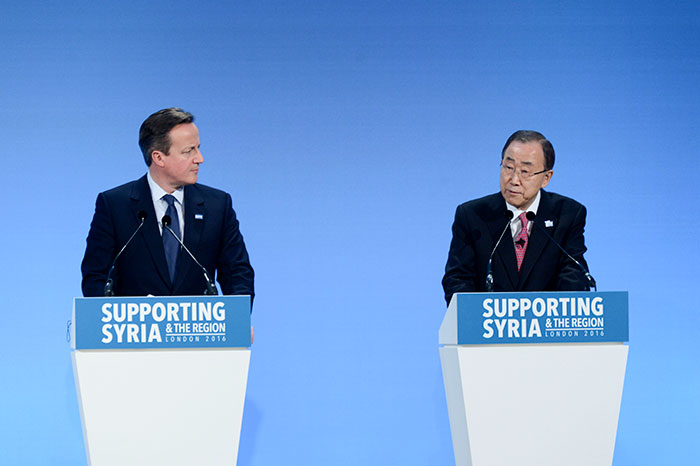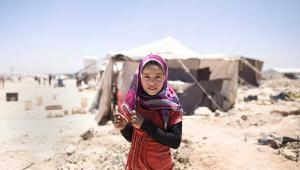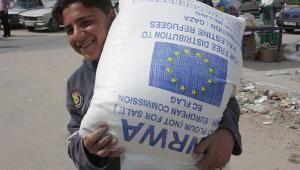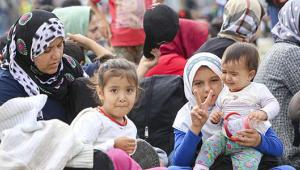web_uk-prime-minister-david-cameron-and-un-secretary-general-ban_24190926323_o.jpg

UK prime minister David Cameron and UN secretary general Ban Ki-Moon at the Supporting Syria and the Region Conference yesterday
United Nations secretary general Ban Ki-Moon hailed the conference as a “great success” after at least $5.6bn was raised for 2016 alone, and a further $5.1bn for 2017-20.
The event also saw pledges from the international community to ensure that all Syrian children and children in host communities have access to education by the end of the 2016/17 school year, ensure job opportunities for adults and to guarantee that parties to the conflict uphold international humanitarian law.
“[The] conference has seen the largest amount of money ever raised in one day in response to a humanitarian crisis with well over $10bn pledged,” said UK prime minister David Cameron yesterday.
“[It] has been and is a day about saving lives, a day about building futures, a day about giving people the chance of a future, the chance of a life. It means millions of people will now receive life-saving food, medical care and shelter in Syria and beyond,” he continued.
The fourth session of the conference saw a pledging round focused on the situation inside Syria, which Ban described as “as close to hell as we are likely to find on this earth”. The session raised around $662.5m.
The Aga Khan pledged to provide $200m to the crisis over the next four years, expanding efforts to wider areas of Syria and being used to achieve peace, stability and reconstruction.
The Netherlands announced it would mobilise €225m in 2016 to help meet the needs for investment in trade, infrastructure, education, and the rights of women and girls. Sweden also revealed a €200m pledge, but to be spread over five years, which would be used to increase economic opportunities, build Syria’s capacity to provide basic services and strengthen democratic forces in the country.
In addtion, Sweden pledged a further $41m in humanitarian aid. Brazil announced it would purchase $1.85m worth of rice and donate $1.3m to the office of the UN High Commissioner for Refugees.
The final two pledges made were at least €6m from the Czech Republic, which would be used to pay special attention to healthcare and education, and €2.3m for Jordan and Lebanon from Cyprus.
Education was the focus of the following session. Commitments included pledges from Luxembourg (€7.5m per year for five years), Slovenia (€200,000), Greece (€300,000), Iceland ($3.9m) and Mexico ($5m).
The final pledging session closed the conference with pledges from Spain (€7m), and Hungary, who committed to building and operating a hospital in Syria worth €5m as soon as security conditions allow.
At the end of the session, Justine Greening, the UK’s international development secretary, said the result was a “phenomenal, record-breaking total that fully reflects the enormity of the crisis we are facing and the scale of the suffering”.
However she added that the international community needed to deliver on its “unprecedented response to this unprecedented crisis”. NGOs have called for robust and transparent measurements of the pledges.
Raed, al-Saleh, head of the Syrian Civil Defence or The White Helmets, added: “Of course we welcome the funds pledged … but all the money in the world won’t protect children in their beds from barrel bombs.
“We need action to stop the indiscriminate bombardment of Syrians, to protect those under siege and facing starvation, and those barred by violence or bureaucracy from safely accessing food, water and shelter.
“We urge all those with influence to exert concerted diplomatic pressure on all parties to comply with international humanitarian law and with the UN Security Council’s binding resolutions.”
Salma Kahale, executive director of Dawlaty, a Syrian human rights organisation, also noted that while the money pledged will go some way towards alleviating the suffering of those affected by the Syrian conflict, the overall amount “falls far short of what is urgently needed”.
The United Nations humanitarian appeal for Syria and the region alone is $7.73bn for 2016. The governments of Syria’s neighbours are appealing for further $1.2bn.













